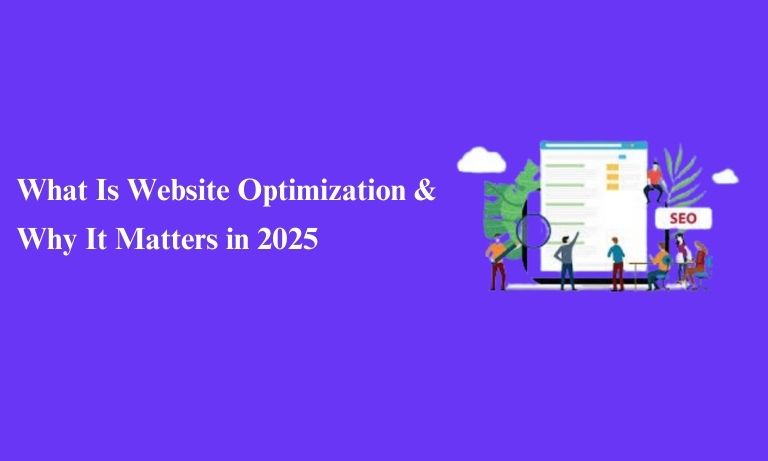Let’s face it if your website isn’t pulling its weight in 2025, it’s probably time for a tune-up. So, what is website optimization, really? In simple terms, it’s the art (and science) of fine-tuning your site to deliver a faster, smoother, and more engaging experience to your visitors. But don’t be fooled, it’s not just about speed. It’s about making sure your website is doing exactly what it’s supposed to: converting visitors, ranking in search engines, and giving users a seamless experience. Curious why all this matters more now than ever? Stick around we’re diving deep into the digital trenches.
What Is Website Optimization Makes or Breaks You in 2025
2025 isn’t just another year, it’s a digital jungle out there. Competition is fiercer, user attention spans are shorter, and let’s be honest, patience? Practically extinct. So if your site takes forever to load or feels like it was built in 2009, guess what? People bounce.
Website optimization isn’t just a technical term, it’s a full-on survival strategy. Whether you’re a brand-new startup or an old-school company trying to stay relevant, getting this right is non-negotiable.
Understanding What Is Website Optimization in Digital Marketing
Here’s where things get juicy. In digital marketing, optimization is the not-so-secret weapon of pros who know the game. It’s how brands make their websites faster, more discoverable, and ridiculously effective.
Website optimization in digital marketing includes:
- Speeding up page load time
- Improving mobile responsiveness
- Enhancing UX/UI design
- Crafting SEO-friendly content
- Streamlining user journeys
- Eliminating unnecessary scripts and clutter
Basically, it’s everything that makes your website shout “click me” louder than your competitors’.
How to Optimize Website Performance Without Breaking a Sweat
Now let’s get to the “how” part. Sure, website optimization might sound like rocket science at first, but with the right moves, it’s actually pretty doable.
Here’s a step-by-step rundown:
- Audit your site – Use tools like Google PageSpeed Insights or GTmetrix to see where you’re slow.
- Compress images – Huge files slow everything down.
- Use a content delivery network (CDN) – It brings your content closer to users.
- Minify code – Trim that fat off your HTML, CSS, and JavaScript.
- Implement caching – So repeat visitors aren’t loading everything from scratch.
- Switch to a better hosting provider – Sometimes, speed comes down to your server.
It’s all about shaving off seconds (or even milliseconds) and giving visitors no excuse to leave.
Why Is Website Optimization Important in Today’s Digital Age?
Oh, where do we begin? The stakes are high, and here’s why website boost should be at the top of your digital to-do list:
- First impressions matter – Visitors judge your site in under 3 seconds.
- SEO rankings love it – Search engines prioritize speed and mobile usability.
- Conversions increase – The smoother the site, the better the chances someone buys, signs up, or clicks.
- Reduced bounce rate – A slow, clunky site sends people running.
- Better mobile experience – With more users on phones than ever, mobile optimization isn’t optional.
In short? A well-optimized site is a money-maker. A sluggish one? Just digital dead weight.
Website Optimization Strategies That Actually Work
You don’t need a tech wizard in your corner to get started. A smart blend of tactics can do wonders:
- Focus on mobile-first design
- Use lazy loading for images and videos
- Update outdated plugins or themes
- Streamline navigation for intuitive UX
- Integrate schema markup for better SEO
- Enable Gzip compression
- Craft engaging, keyword-optimized content
Start with the low-hanging fruit, then level up your game as you go.
Website Optimization Tools Free & Fabulous
No need to throw money around just yet some of the best tools won’t cost you a dime.
Here are a few must-tries:
- Google PageSpeed Insights – The gold standard for performance insights.
- GTmetrix – Deep dives into speed and optimization opportunities.
- Lighthouse (via Chrome DevTools) – Great for audits and accessibility checks.
- Ubersuggest – Handy for SEO and content ideas.
- Screaming Frog (free version) – Technical SEO scans at your fingertips.
- Pingdom – Performance testing with a user-friendly interface.
Mix, match, and find what suits your workflow.
FAQs
Q: What’s the difference between website optimization and SEO?
A: SEO is part of website optimization. While SEO focuses on making your site more visible to search engines, optimization covers everything from loading speed to user experience.
Q: Can I optimize my website without coding skills?
A: Absolutely! Many tools offer visual editors and plug-ins that simplify the process. No need to touch a line of code.
Q: How often should I optimize my site?
A: Regularly. Think of it like a car. You need routine check-ups to keep things running smoothly.
Q: Does website optimization impact mobile users?
A: Big time. Most web traffic now comes from mobile devices, and Google’s mobile-first indexing means it’s a make-or-break factor.
Q: How long does it take to see results from optimization?
A: Some improvements (like speed) are instant. Others, like SEO benefits, take a few weeks but the payoff is worth the patience.
Conclusion
There you have the full lowdown on what is website optimization and why it’s absolutely critical in 2025. It’s not just about faster pages or higher rankings. It’s about staying alive and thriving in an online world that waits for no one. From digital marketing to user satisfaction, the impact is real, and the tools are right at your fingertips.
So don’t wait. Give your website the love it deserves. Because in 2025, if your site’s not optimized… it’s just invisible.

Leave a Reply